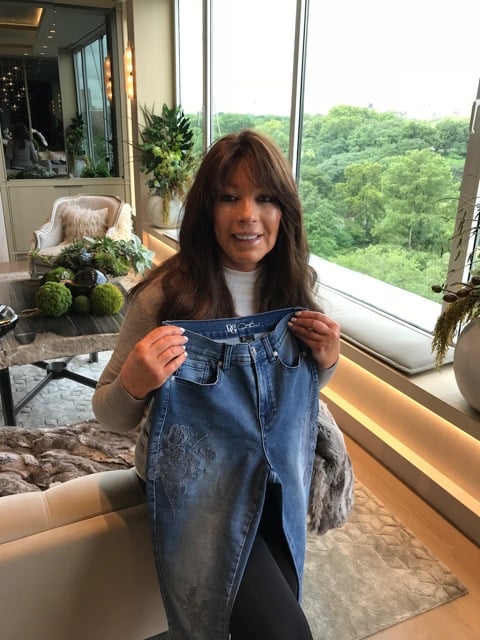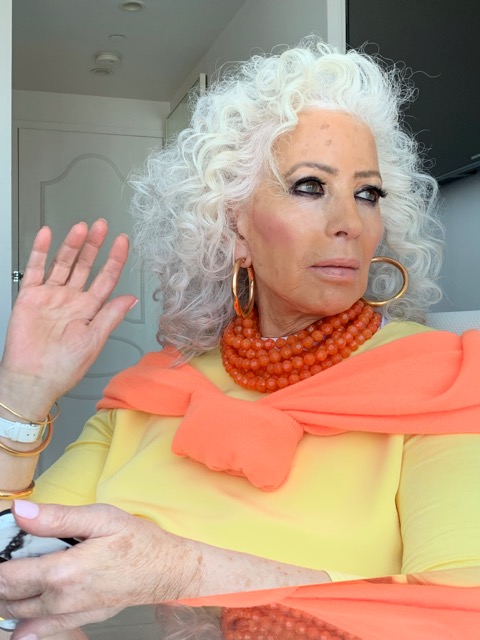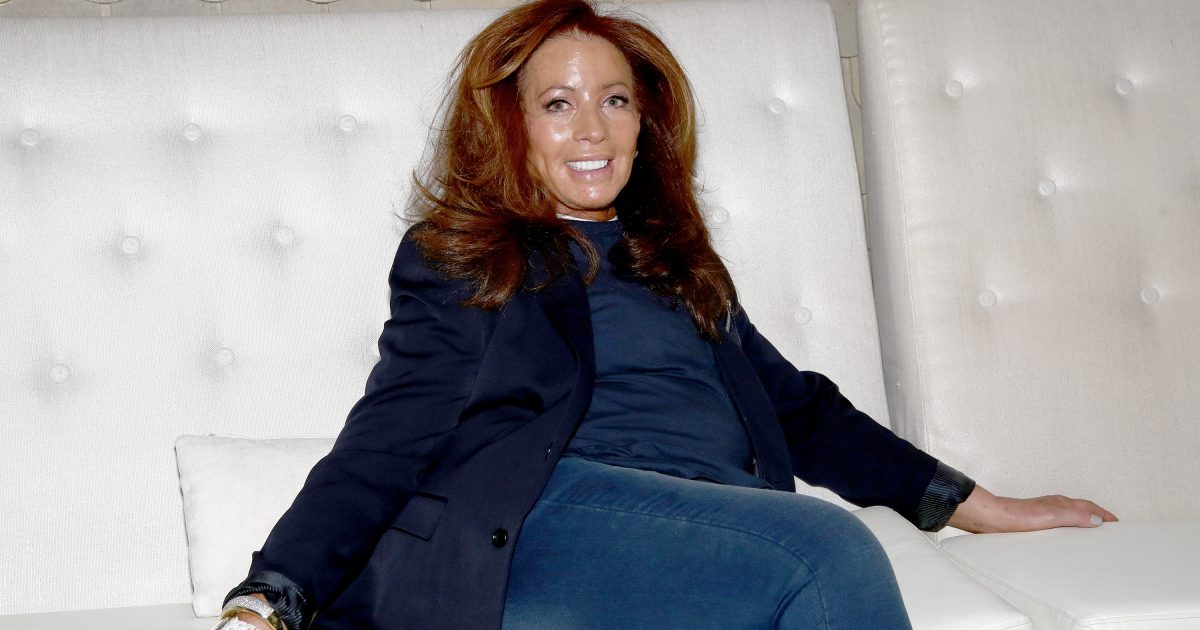Diane Gilman, the fashion designer known as the "jean queen" of television shopping channel HSN, has a wish for women who suddenly face cancer.
"I would love for more women to be less terrified of getting that diagnosis and be able to take their feelings and their experiences…as a stepping stone to a better future," says Gilman, a popular on-air personality whose jeans line made her an HSN mainstay.
Read More
A Christmas Eve Diagnosis
Not that Gilman was challenged when it came to connection. She received her breast cancer diagnosis on Christmas Eve, 2017. She informed her HSN viewers the following month that she was going to have to put her TV appearances on hiatus. Then, she watched as 130,000 "messages of compassion" poured in.
The fan reaction reflected how important Gilman had become to their lives. Gilman has been on HSN, formerly Home Shopping Network, for more than a quarter-century. She was a fashion innovator who reinvigorated her career late in life.
She did it by making jeans for middle-aged women who had been left out in the fashion cold by cuts that didn't flatter their maturing bodies. As she recounted in her 2013 autobiography Good Jeans: 10 Simple Truths about Feeling Great, Staying Sexy & Aging Agelessly, Gilman said she made the pants legs skinny, the waists larger and the rises higher. HSN ordered 5,000 pairs and allotted her an hour of airtime to pitch them during one 5 a.m. Sunday slot. The jeans sold out in minutes.
As she entered her 70s, what she now calls the "third act" of life, Gilman wrote of being engulfed by a sense of success and satisfaction. Born in Beverly Hills with a strained relationship with her parents, she discovered a talent for fashion with some of her early designs snapped up by celebrities like Cher. She moved to New York and lived the high life, partying at Studio 54 during the disco era and seeing her work featured at major department stores.
Then came cancer.
No Pity
"When you're in the fashion industry and when you're on television, you live in a bubble, you live in a very privileged world," she said. "I live in Manhattan, but cancer doesn't give a damn about any of that."

Gilman was shocked by the diagnosis. The cancer was stage 3 and had spread to both breasts. Almost as bad was the reaction of those around her. Some cried, but she wanted no pity. She would tell them to go out in the hallway and not return until their sobbing subsided. After all, they had work to do.
"It was difficult talking to everybody because the minute you tell people you have cancer, especially stage 3, they treat you like a dead person. They treat you like you're going to die," Gilman said.
Gilman said cancer didn't run in her family. She had never even been hospitalized. She ate healthy food, exercised, didn't smoke and avoided sugar. She believes her cancer was due to hormone replacement therapy, which she had tried in hopes it would help keep her skin and hair looking youthful for TV.
She rejected non-traditional treatments. One devout Christian acquaintance had her fall to her knees in the rain in a parking lot in order to "put some voodoo thing on me" in hopes it would magically take away the cancer. Another suggested a faith healer in the Philippines.
But Gilman put her faith in her doctors, especially surgeon Dr. Elisa Port at the Dubin Breast Center at the Mount Sinai Hospital. Gilman said Port put her health crisis in perspective, pointing out that she was an otherwise healthy person with cancer that appeared localized. Beating it would be hard, but that women like her in demanding jobs were accustomed to toughing things out.
Filled With Gratitude
Gilman, now 76, put in the work. After chemo, radiation and surgery, there were no tumors remaining and she underwent breast reconstruction. After 10 months, she was able to return to her business, two months sooner than expected and filled with gratitude.
One lingering issue resulted from the cancer, Gilman developed lymphedema, which limits the mobility of her left arm. Lymphedema is fluid-caused swelling. She considers lymphedema just as just another malady, not a major concern. She deals with it by staying active and exercising. One favorite routine: dancing around the house while watching rock videos. "I'm going to take care of it and live on another 25 years," she said of the lymphedema.
Gilman has tried to make other post-cancer improvements in her life. She said she tries to be more patient, to be an agent of cheer at a time when the coronavirus pandemic has left so many depressed. She pictures herself as an eagle soaring over the landscape of life.

Her ordeal left her hopeful that in the not-so-distant future, cancer will be largely controlled. Gilman said she believes we're entering an era when cancer will become a chronic yet maintainable disease, not a fatal one.
Gilman plans to lend her eagle eyes of observation and the story of her cancer struggle to a new book about the latest chapter of her life.
"I want to make my third act spectacular," she said. "I want to make women feel better about themselves in terms of aging and hopefully be able to give them advice and bring them products and make them feel stimulated and alive and purposed."
Not unlike the satisfaction that comes from a form-fitting pair of jeans.
When Should I Get a Mammogram?
Hormone Replacement Therapy and Breast Cancer
Experts tell SurvivorNet that taking hormone replacement therapy during menopause can lead to an increased risk of breast cancer.
Dr. Diana English, a clinical assistant professor of obstetrics and gynecology at University of South Florida, says hormone replacement therapy in older patients has been studied in clinical trials.
“And there has been some association with an increased risk of breast cancer, particularly if there’s a combined use of estrogen and progesterone hormone replacement therapy. There’s also an increased risk of strokes, blood clots in particular,” she says.
Dr. English says that if a doctor is recommending hormone replacement therapy, a patient should ask why the recommendation is being made and what the risk factors are.
“Hormone replacement therapy, if given to a woman that has a uterus in place, an intact uterus, should be a combination of estrogen and progesterone, so that the progesterone component of the hormone replacement therapy is there to protect the lining of the uterus from the unopposed estrogen use. The unopposed estrogen use could lead to thickening of the lining, hyperplasia, and even, cancer of the uterus,” she says.
In general experts agree that cancer is generally not caused by one singular factor.
“Doctors like to think we can answer in an authoritative manner exactly why somebody has gotten their breast cancer, but in almost all instances, it’s usually a combination of multiple factors,” says Dr. Elizabeth Comen, a medical oncologist at Memorial Sloan Kettering in New York. “Even for women who have an increased risk of breast cancer because they inherited a gene mutation…Not every woman with those mutations ends up getting breast cancer. So we know that even for women who may have had a very big lifetime risk of having breast cancer, other factors must have contributed to that risk. So, in some instances women have had a family history, in most instances we don’t know. It could be a host of multiple factors that came together, whether it’s just being an older woman, because again breast cancer as you get older the risk of the diagnosis increases. Certainly there can be lifestyle factors, maybe a woman took hormone replacement therapy. But even that, there’s usually never one screaming red flag that says this is why you got breast cancer. ”
Tough Decisions: When You Know You Have a High Risk of Breast Cancer
Learn more about SurvivorNet's rigorous medical review process.


